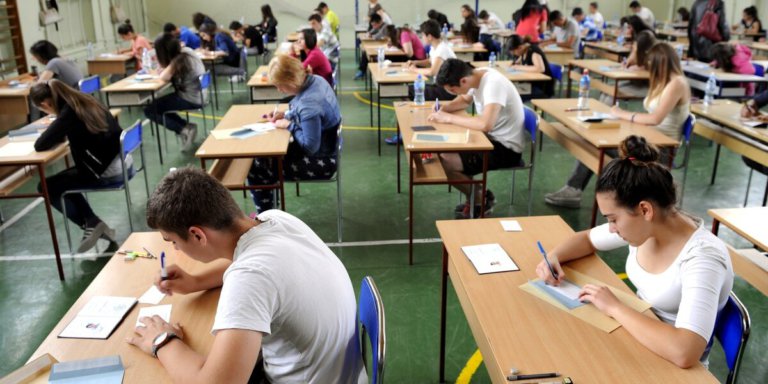
A school in India has come under fire after posting viral photos of students wearing cardboard boxes on their heads to prevent exam cheating.
While management at the school have stated that it was an experimental measure approved by parents and that it was not mandatory for students to wear the boxes, it reflects the lengths some schools and teachers go to to curb cheating.
According to CNN, “The Bhagat Pre-University College in Haveri, in India’s southwestern Karnataka state, implemented a trial run of the new measure last Wednesday, according to school management head M.B. Sateesh.
“A staff member photographed the students sitting in neat rows, their heads obscured by cardboard boxes.
“The front of the boxes had been cut out, allowing students to see their desks and exam sheets but restricting their vision, similar to blinkers used on a horse.”
Karnataka: Students were made to wear cardboard boxes during an exam at Bhagat Pre-University College in Haveri, reportedly to stop them from cheating. (16.10.2019) pic.twitter.com/lPR5z0dsUs
— ANI (@ANI) October 18, 2019
Students are notorious for being extremely creative when it comes to cheating which can be frustrating for teachers.
But there’s no need to make them wear cardboard boxes on their heads; not only could it be a safety hazard, but it’s demeaning to treat students like animals.
Here are some better ways to prevent exam cheating in schools:
Have different versions of a test
The moment a kid asks how you know they cheated and you look them in the eye and tell them there are multiple versions of the test… and they copied the wrong one. @HSTeachProbs
— MW (@mdw1988) February 9, 2019
To prevent students from looking over the next desk to copy answers, give out different versions of a test or exam.
Let students know that the person sitting next to them has a different version so they won’t be tempted to cheat.
Make sure you keep track of the different versions by asking students to note down the number on their exam paper on their answer sheet.
Remind students of the rules
Schools often have policies over students cheating on exams and the repercussions if they’re caught. But sometimes students and potential cheaters need to be reminded of these so they’re aware of the consequences.
Before a test, or even during one, remind students of the policies and what happens if they’re caught cheating in exams. This might just be the wake-up call they need to keep their eyes on their own paper.
Don’t give out multiple choice exams
As #educators, if we eliminated the use of “one-word” or “multiple choice” type questions to evaluate #learning, could we then begin to spend less time focusing on #cheating? pic.twitter.com/fTRpLoEbqV
— Kent Brewer (@brewer_kent) August 26, 2018
While some schools may still require standardised testing, many are moving away from multiple choice questions as they require students to memorise material instead of really understanding the content.
If you have the choice, don’t test students via multiple choice questions, but instead test them through subjective or essay questions.
This allows them to better grasp the material and makes it harder for students to cheat, while simultaneously making it easier to catch a student cheating if their answers are similar to another.
Test in small groups to prevent exam cheating
This may not be logistically possible for some schools, but wherever possible, conduct exams or tests in small groups or classrooms.
It will be easier to keep an eye on cheaters and students would possibly feel more “watched”, leading to less temptation to cheat out of fear of being caught.
Restrict additional items in the classroom
You find pen smudges on the inside of their hand.
What? Cheating in school is still cheating. pic.twitter.com/9jEyBMO1eP
— ceneblock (@ceneblock) September 12, 2019
Students are very innovative when it comes to sneaking answers into a test room.
An article by Telegraph revealed that some common ways students cheat are includes putting answers in a calculator beforehand, writing them on fingernails, putting notes in hollowed-out pens, and even writing notes on the inside cover of a water bottle label and sticking it back on.
Students should not be allowed to bring in personal devices or wear hoodies in the classroom as some are known to write answers in the sleeves or leave them in the hood.
Restricting items that students can bring can reduce the ways they sneak in notes and answers.
Provide pencils, erasers, pens, calculators and water bottles in the classroom so students don’t need to bring their own, if possible.
Liked this? Then you’ll love…
What happens if you are caught cheating on your IELTS test?
Cheating cases on the rise in UK exams – mostly due to mobile phones







